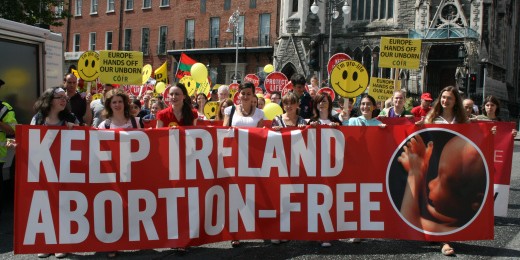It has been a bad few weeks for those of us who value life from conception to natural death. First, there was a huge backlash against the National Maternity Hospital being situated in the grounds of St Vincent’s Hospital.
The perceived problem was that there might be any Catholic influence whatsoever in the place, particularly when it came to abortion.
The level of vitriol against the Sisters of Charity was shocking. Most of it was based on the fact the Irish Sisters of Charity once ran Magdalene Laundries, and secondly, the allegation that they had not paid what they had promised in the Residential Redress Scheme.
While the suffering of innocent young women who were sent to Magdalen Laundries should never be forgotten, the public conveniently ignores the role that families and society in general played in maintaining a narrow and punitive approach to sexual morality.
Culpability
Not to mention the State’s culpability, ably outlined in the submission, ‘State involvement in the Magdalene Laundries’. This submission was written by Dr James Smith of Boston College and Maeve O’Rourke. It was submitted on behalf of the Justice for Magdalenes group to the Inter-departmental Committee investigating State involvement with the Magdalene Laundries.
It describes how the State was involved in sending women and girls to the Magdalene Laundries and ensuring that they remained there – in most cases, without any statutory basis for doing so.
Yet the preferred option of the public is to continue to vilify the sisters who were involved, but to hand over the new National Maternity Hospital to the same State which failed the women of the Magdalene Laundries in multiple ways.
David McConnell, professor emeritus of genetics at Trinity College, made a statement on the Marian Finucane radio show about St Vincent’s, which I found quite chilling.
He said that we have to look further down the road, perhaps in 10 years’ time, when there might a facility dedicated to abortion in the maternity hospital. How would the Sisters of Charity cope with that?
He was perhaps more prescient than he realised. The day before he mused aloud about abortion facilities, the Citizens’ Assembly had voted not to repeal the Eighth Amendment, but instead to turn it into a positive provision, mandating the Government to legislate for abortion.
Unrepresentative
The afternoon after he spoke, the Assembly voted to allow abortion on every possible ground, and in case there might be any confusion, voted a final time to allow abortion for any reason whatsoever up to 12 weeks gestation, with a slightly smaller number voting for abortion for any reason up to 22 weeks.
A provision originally inserted into the Constitution to protect both the life of the mother and the unborn baby will, if the Citizens’ Assembly has its way, instead mandate the taking of unborn life for virtually any reason that you can imagine. Down Syndrome, spina bifida, cleft palate, economic reasons – all will be acceptable motives to end an innocent life.
There is no way that these radical proposals represent the will of the Irish people. Either the Citizens’ Assembly was unrepresentative from the very beginning, or the balance of speakers and presenters was such that they were persuaded to take a radical stance on abortion provision.
Resolve
But we cannot rely on our elected representatives to protect unborn life, either, as the only political party that is pro-life, Renua, has no elected representatives.
I only attended the Citizens’ Assembly on one occasion, when Maria Steen of the Iona Institute was speaking, and I was on a large panel with her in order to answer any questions that arose from the Assembly.
The pro-life representatives received most of the questions, the majority of which came from a pro-choice perspective. I had a feeling of foreboding, which has been amply confirmed by the Assembly’s outcome.
The Irish people are not ready to legislate for abortion on demand. But for how long will that resolve last?
It is so easy to manipulate public opinion these days. The Irish Sisters of Charity were vilified for not paying their share of the Residential Redress Scheme but the Daily Mail revealed that it had been paid in full. By foregoing legal fees that were due to them under the Residential Redress agreement, the sisters had more than repaid any outstanding monies.
People also conveniently forgot all the good the religious did, and do. There would not be any St Vincent’s Hospital if the sisters had not worked for without salaries for generations.
But the sisters cannot in conscience provide land where abortions will be carried out. The clamour may have one good outcome – it may allow the sisters give courageous witness to the value of unborn life by withdrawing from the deal. That kind of courage is badly needed in an Ireland where respect for life is rapidly vanishing.


 Breda O'Brien
Breda O'Brien
